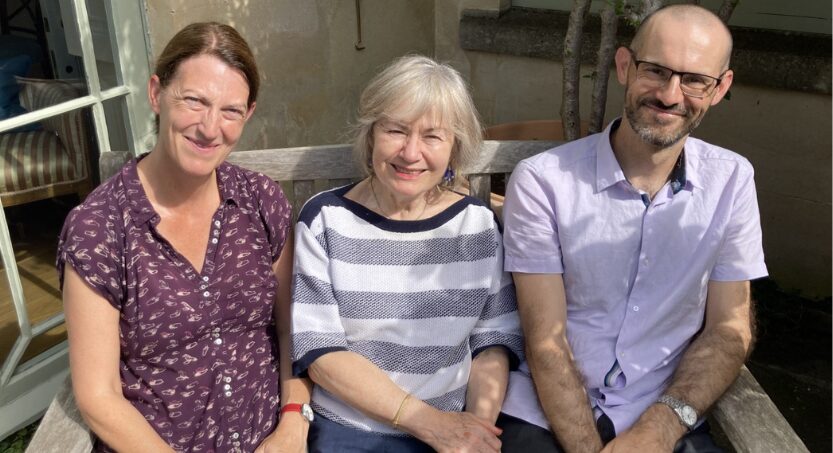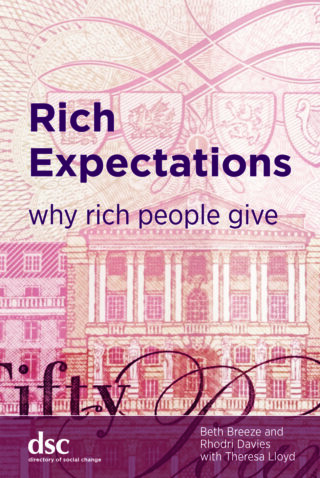Q&A with Rhodri Davies, author of Rich Expectations: Why Rich People Give

Rhodri Davies’ latest book explores how expectations shape approaches and attitudes toward giving among UK donors and is the third in a series examining philanthropy through the lens of funders. Rhodri, founder of think tank Why Philanthropy Matters and a key speaker at PA’s UK study tour last year, authored the book with Professor Beth Breeze OBE, who presented at the Philanthropy Australia conference in 2022, and researcher Theresa Lloyd.
The authors surveyed and/or interviewed 88 UK donors. Half were ‘established’ philanthropists, who had participated in previous research, while the other half were ‘emerging’ having been part of previous studies. The typical donor profile included an annual income of at least £250,000 and a net worth of £10 million or more, with annual donations ranging from £6,000 to £25 million, with the most common size being around £500,000. The study was done in conjunction with the Directory of Social Change and funded by the Pears Foundation.
The book also provides recommendations on how to build a renewed culture of philanthropy and charitable giving in the UK and are aligned with the draft National Strategy for Philanthropy and Charitable Giving created by many across the UK sector.

Giving News (GN): One of the key themes of the book is how unspoken expectations play an enormous role in the way philanthropy functions. Can you unpack your findings on this?
Expectations also surfaced in the donor-charity relationship. Donors had views on how charities should operate, from impact measurement to feedback mechanisms. And charities had expectations around the nature of gifts, restricted or unrestricted, and donor engagement. Problems often arise when these assumptions remain unspoken. The book encourages making expectations explicit to foster more productive, fulfilling philanthropic conversations.
Rhodri Davies (RD): Societal, personal and relational expectations run through the philanthropic landscape. Donors spoke of external pressures tied to wealth and internal motivations shaped by upbringing or faith, for example. Many set personal giving benchmarks, often as a percentage of income or assets, though some preferred to keep their giving rules private, underscoring the moral complexity of giving.
GN: Did you see any differences in the way younger donors are approaching giving?
RD: Younger donors stood out. They are entering philanthropy already aware of critiques around power dynamics, transparency and the ethics of wealth. Unlike older donors who encountered these issues later, next-gen philanthropists are proactively reshaping their approach. They’re considering not just how money is given, but how it’s made and invested. Their giving isn’t radically different, but it reflects a more critical, values-driven mindset.
GN: What other shifts in donor behaviour did you see?
RD: Since 2012, support for traditional causes like arts, culture, and higher education has declined in favour of more human services, welfare and medical funding. This might be a knock-on effect of the pandemic. While the percentage of donors supporting environmental causes has increased, it still ranks relatively low overall. More notably, donors appear to be giving to a broader range of causes. Even when certain areas rank lower, the number of donors contributing to them has risen, suggesting a more diversified approach.
This trend may reflect a growing awareness of multiple pressing global issues. It’s speculative, but this broader mindset could signal a shift from narrowly defined philanthropic identities to more responsive, issue-aware giving.
GN: Were there any notable shifts in donor practices?
RD: Many donors are increasingly aware of the power dynamics between themselves and their grantees. Notably, many now recognise the importance of providing core cost or unrestricted funding, contrary to the common belief that donors resist such support. We found donors more open to giving in this way, provided they have confidence and trust in the organisations.
This shift suggests a growing understanding of the value of flexible funding and a willingness to build stronger, more equitable relationships. Encouragingly, there are signs of greater potential for establishing sustainable core funding partnerships that better meet the needs of charitable organisations.
GN: What were common themes from funders in the family foundation space?
RD: Families continue to play a vital role in shaping philanthropy, whether through upbringing or intentional efforts to involve younger generations. This often intersects with concerns about wealth transfer and its impact on children. Many shared stories highlighted how philanthropy can unite families around shared values, though it’s not always easy.
Multigenerational giving requires compromise, communication and sometimes “managing upward” from younger members. It’s a process that demands effort, but the rewards – stronger bonds and meaningful legacy – are worth it. Those navigating family philanthropy shouldn’t be discouraged by initial differences; alignment takes time, but it’s achievable with patience and commitment.
GN: What’s your favourite insight?
RD: My main takeaway from the book is that despite global challenges, climate change, the polycrisis, and questions about philanthropy’s role and legitimacy, action matters most. Donors consistently emphasised the importance of not getting stuck in endless reflection.
Yes, thoughtful, informed giving is crucial, but ultimately, you have to start somewhere. Do the best thing you can now, then the next best thing, and keep going. Philanthropy is a practice, not just a concept. For those of us who talk about it often, it’s a vital reminder: discussion has its place, but real impact comes from doing. That’s what truly counts.
Prof Breeze co-founded and was Director of the Centre for Philanthropy at the University of Kent from 2008 to 2025, and is now Principal of Harris Manchester College, Oxford. Rhodri Davies is , a Research Fellow in the Centre for Philanthropy at the University of Kent, and Philanthropy Expert in Residence at the Pears Foundation. Theresa Lloyd is a well-regarded philanthropy expert and has undertaken pioneering research into the motivations and philanthropic practices of the wealthy.
Rich Expectations: Why Rich People Give is available in Australia online or from the UK’s Directory of Social Change.
Main image: Beth Breeze, Theresa Lloyd and Rhodri Davies.